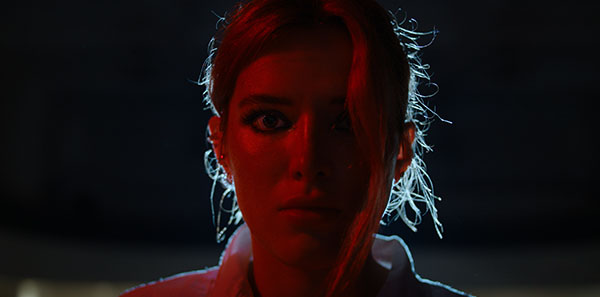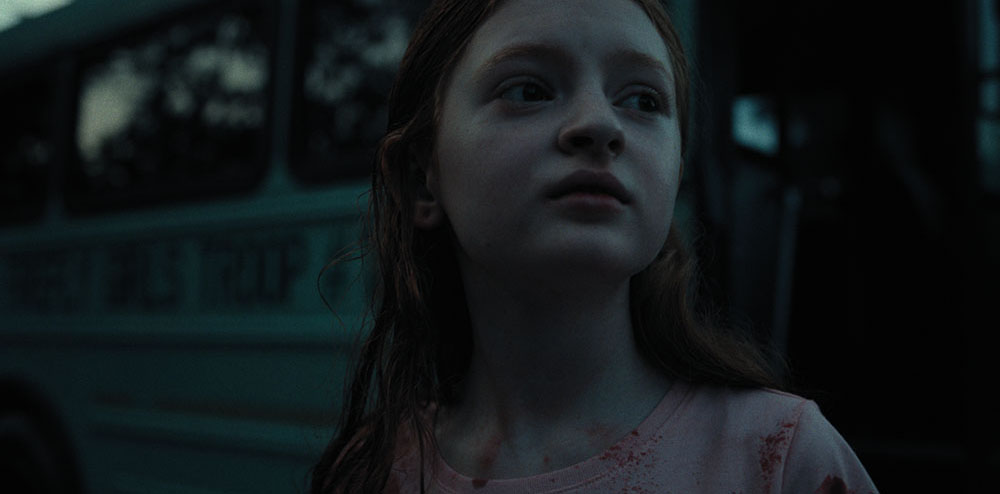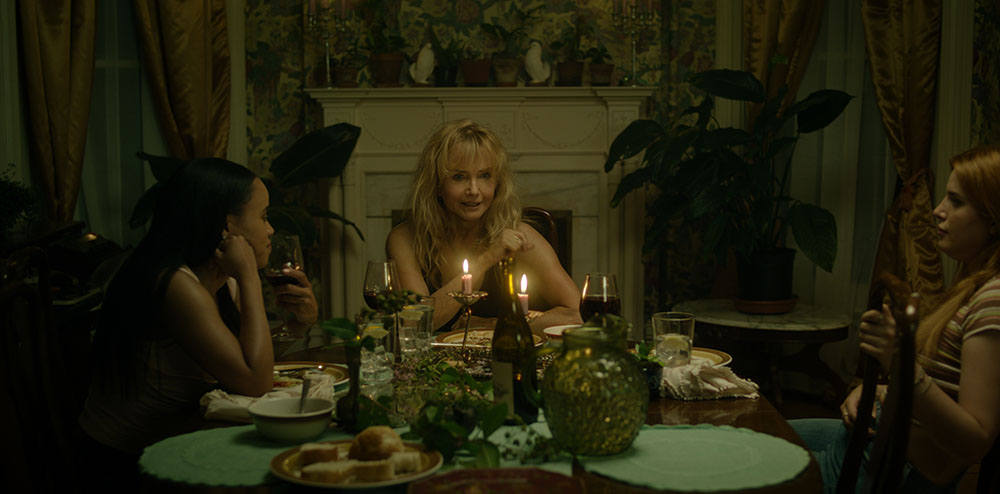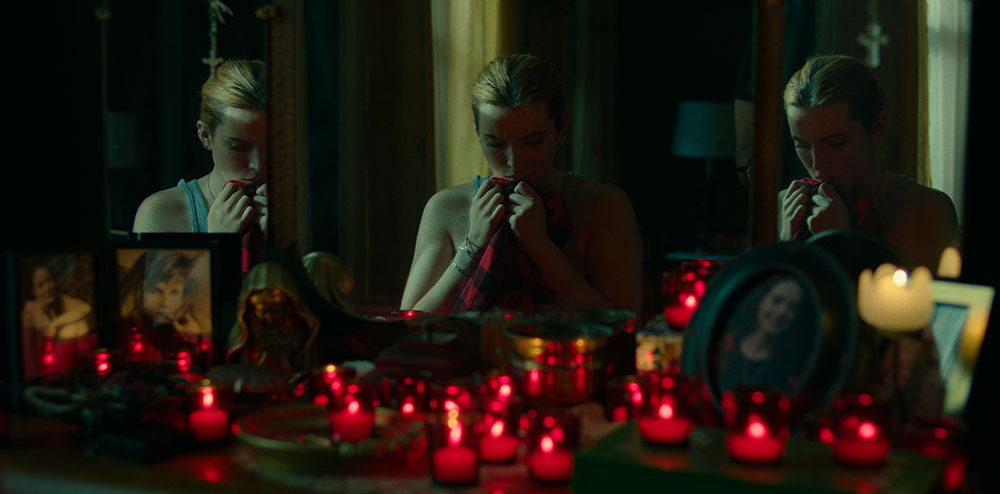Killer Queen: Mitzi Peirone for SAINT CLARE
- Rich

- Jul 14, 2025
- 8 min read
Seeing red... and the dead

Having become the first person to successfully fund a feature film with cryptocurrency at the age of 26 with 2018’s Braid, award-winning Italian film director and screenwriter Mitzi Peirone returns with her latest feature Saint Clare. Based on Don Roff’s best-selling novel Clare at Sixteen (2021) this is the story of Clare Bleecker who appears to be a “normal” twenty-something — Catholic, animal lover and devout vegan living with her grandmother in the small town of Pickman Flats. But Clare harbours a hidden trauma she attempts to bury deep down inside, her dark side screaming all the louder to break free as her dissociative identity disorder triggers her serial killing dual identity. Bella Thorne portrays a new “Killer Queen” for the big screen switching things up from school to the University campus, presenting a familiar slasher territory.
Mitzi recently sat down with me for a chat about what she brought to the adaptation, her love of symbolism and the complexities of anti-heroes...
What attracted you to the monstrous femininity of Clare Bleecker?
Clare Bleecker is somewhere between a female “American Psycho” and a modern-day Joan of Arc. I was fascinated by the idea of this young woman who had a very strong sense of authority and also a very strong sense of self; almost to the point of self-annihilation. “It doesn’t matter what happens to me as long as the ideal lives.” I feel as though this concept can draw her closer to a villain, someone who is ready to sacrifice everything for what they believe the world needs, and maybe that’s what Clare is. I think Clare’s journey is one of a person feeling plagued by her own shadows and desperately trying to course correct, but who inexorably falls back into the patterns of her fate until it dawns on her that perhaps her shadows may just be what the world needs; she will let the flames consume her as long as what she leaves behind can be brighter.

Pictured. Director Mitzi Peirone
Why do you feel an audience relates more to such darkness in a character?
I think that intimately we relate more to anti-heroes than to heroes because we’re all flawed in some way, yet we wish the best for ourselves and the best for others. In both my films I played with Nietzsche’s idea of the eternal return, that despite our best efforts to overcome our long shadows, we ultimately do return to the same places we tried to escape from — that doesn’t mean to be a pessimistic or bleak outlook, but I do feel that genre cinema resonates with so many because it also offers company to anyone lost within a forest dark, and helps them feel a little less alone. I love Dante’s Inferno for that very reason, like probably everyone else who’s fallen in love with it.
How does Clare survive this world?
If we see her as an antihero (which she is), or even a villain — villains don’t try to survive necessarily, instead, they are ready to sacrifice themselves for the mission. In Clare’s case, in order to eradicate an evil she has to become the evil itself and that turns into a very self-destructive pattern and, in a sense, she realises that self-annihilation, self-immolation and martyrdom are inevitable if she is to be successful.
Clare knows she was given a gift, maybe a cursed gift, but that cannot come without an element of sacrifice. That’s why her solitude is part of the price to pay, along with feeling misunderstood and rejected; although Clare does also hurt others and that too cannot come without consequences. Character is destiny. Clare plays with life and death and by doing so she is engraving her destiny onto herself.

In the hands of god. Clare Bleecker (Bella Thorne) reflects on "everything she has said and done"
Why do you feel so many people relate to horror?
If we want to think of Greek tragedies as the incipit of Western literature, we have to think of them in their historical context and those were rather difficult times: decade-long wars, famines, natural disasters, disease and general societal hardships, yet those were also the times of groundbreaking philosophical, scientific and political achievements. So, if that is the birth of tragedy, to paint with darkness and light and by doing so achieving dramatic conflict, then I think that genre cinema (and, hence, horror) illicit the same result: catharsis. Greek tragedies are designed to be hyperbolically graphic and gruesome and dramatic and heavy in symbolism to help the audience be relieved of their own burdens, and horror, in a very visceral way, does exactly that.
Clare is a tragic heroine also, trying to course correct from the metaphorical blood that was spilt on her from a young age, but inevitably falling back into that original sin. The sliver of hope in this type of character is that Clare at least does her best with her curse, with her shadows. Or at least tries.
“Cinema is dream. Dream is the subconscious mind: transcending time and space, bending laws of physics to make room for poetic logic and metaphors.”
— Mitzi Peirone
I mentioned the Divine Comedy by Dante Alighieri for a reason: it is objectively one of the most revered and studied pieces of literature, and yet it is quintessentially genre. Horror, supernatural, fantasy, adventure. Heavy in symbolism. Heavy in painterly, cinematic graphic allegories. The protagonist, a flawed person, exiled, dealing with a mid-life crisis, lost, going deeper and deeper down the guts of the earth to see the darkest and most heartbreaking corners of the human experience, so that then he can ascend, and us with him. But it is the passage through the shadows that fascinates the most.
The use of symbolism seems to be what you gravitate towards.
Naturally, that’s where I tend to go. I think it’s an incredibly powerful tool that works in the moment, instantaneously on a subconscious level, but that can be revisited and explored and understood further, later. Cinema is dream. Dream is the subconscious mind: transcending time and space, bending laws of physics to make room for poetic logic and metaphors. I love good dialogue, I read all the time, and I am absolutely in love with words — but my heart swells the most when it’s vision and sound alone that unite and triumph in a universal language. Vision is understood by everyone no matter their background. Visual language reigns above all and unites. That’s what made mythology work, that’s what was heavily used in the Middle Ages, and so forth; that’s art history, that’s opera.
“Inevitability” is at the core of this film, especially with the way you thread those Joan of Arc elements throughout. Was that in the source material or something you brought to the film?
It wasn’t in the book, no — but I did take the liberty to give Clare a religious and spiritual dimension because she does attend a Catholic school in the novel, so I thought that kind of environment could have led her to have a very strong inner monologue, like a prayer, and that she could have eventually read about the martyred defender of France, Joan of Arc, and seen her indelible moral clarity and courage as principles to live by. Joan was executed as a heretic but was then sanctified, and I think Clare may think similarly of herself, feeling part delusional and part visionary — she knows part of her journey will be to be misunderstood and called insane, but she knows she has to march forth no matter what.
Other influences were the manga Death Note by Tsunami Ohba, Italian ’70s Giallos and Renaissance paintings of saints and martyrs as well as a touch of Satoshi Kon's Perfect Blue and Pre-Raphaelite art.
Vigilante or serial killer? It's all in Clare's origin story as we witness childhood trauma.
Similar to Naoki Urasawa’s Monster (which I highly recommend), it would seem that the inevitability of what creates a serial killer could be seen as both accidental or by fate.
It’s interesting you say that because the last song that the composer Zola Jesus made for the film is called “Fated.” It’s so incredible because I feel like she crafted a score that brings even more texture and depth to Clare’s psyche. I think that a lot of the subtext lives in the music; like hearing a choir of voices, or this Bulgarian female war chant during a climactic fight scene in the final act. Recently I was revisiting Fight Club and I was reading about this excerpt on it, in regards to “cycles of inexorability”, which is similar to what I had set up in my first film Braid. How “When we’re done having nightmares, they’re not done with us; our shadows don’t expire at midday, we live with them.” But that goes back to Nietzsche’s eternal return, once again, or Sisyphus’s tragic, cyclical destiny pushing up a boulder into eternity. In light of this, I want to reiterate once again that I don’t see any of this as a curse, I think anything worth fighting for or worth creating will have anyone feel like damn Sisyphus and that’s a beautiful thing; to be so mindlessly driven and so enamoured with something you chip away at it every day — you keep writing every day, you keep dreaming every day — and eventually it’s not even about the boulder rolling down, but rather about taking joy in the journey of pushing it up. I feel that way when I make a motion picture, it takes years and I’m happy even when I’m furious and exhausted. It's all reminiscent of Werner Herzog pushing his boat up the mountain in Fitzcarraldo. We all need a boat to push up.
What rabbit hole did you descend there?!
Lots of dots connecting, from the Divine Comedy to mythology and Nietzsche, who was also big on the death of ideals, in a way ushering in a “New World Order,” and in a sense, Clare is that New World Order. Clare is quintessentially anti-establishment. She has no faith whatsoever in authority, she does not believe societal justice can be achieved with traditional avenues, so she takes it upon herself. She rejects society, which is similar to my characters in Braid retreating into make-believe and losing their minds. I think I naturally gravitate towards characters that feel like societal rejects and outcasts. They also reject heteronormative love stories. Instead, they’re solitary and enamoured with their own inner world; fascinated by their own minds and usually out to solve a riddle. In the case of Clare — or the girls in Braid — the questions become: “What happens if I eject myself from reality completely and go elsewhere? And “What is reality but the perception we have of it?” When the only barometer in life is your own perception of yourself, then in a way you’re free. You’re free from fear of rejection, fear of death, the fear of failure, of loss, of solitude… I think this is what my characters have in common, their most important relationship is with their own selves.
Absolutely… and I love all these influences and how they align just as much with manga and other literature rather than a homage to the ’80s masked killers.
Yes! I think in the end the film does feel cohesive thematically and stylistically and this sense of legacy is wholeheartedly carried by Rebecca De Mornay, who beautifully portrays Clare’s grandmother Gigi. She counteracts Clare’s introverted, slightly neurotic and moody attitude with such exuberance and loudness and joie de vivre, she reminds Clare that she actually isn’t alone — but that makes Clare vulnerable and open to potential suffering... and this dichotomy brings dramatic conflict into the picture; Clare needing to be the lonely vigilante but also needing to be part of a family.
Well, it all works, and I wish you all the best with the movie, Mitzi. It’s been lovely speaking to you — thank you for giving me so much in such a short amount of time!
Thank you. You ask the right questions — it’s all you, honestly.
You can follow Mitzi on Instagram. In the meantime, Saint Clare is on UK digital 21 July from 101 Films.











Comments